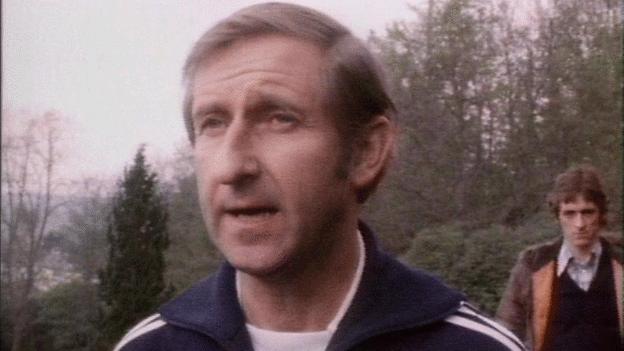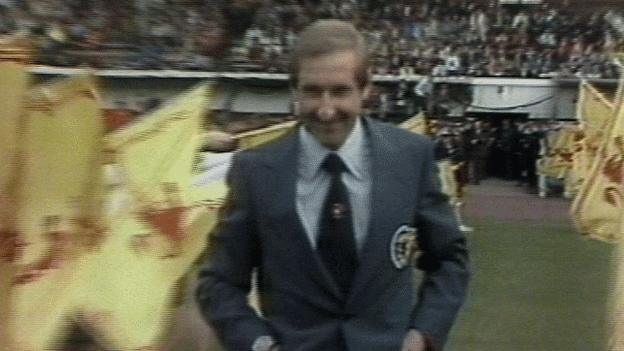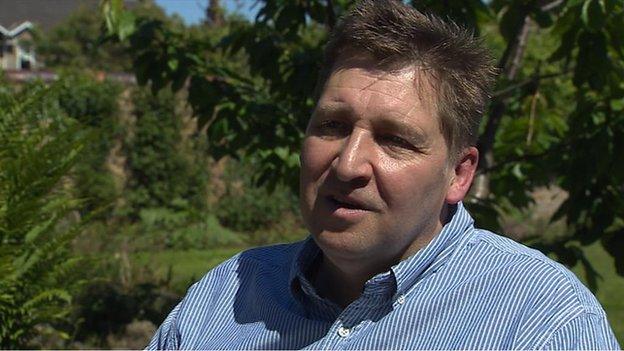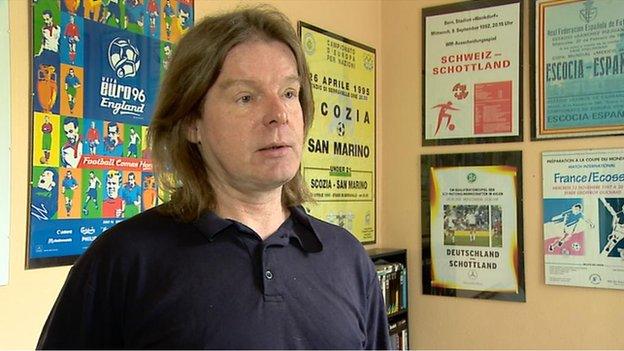Did Ally MacLeod say Scotland would win World Cup?
- Published

Ally MacLeod took Scotland to the World Cup finals in 1978
The World Cup in 1978 famously saw Scotland on the march with Ally's army and about to "shake them up" by winning the tournament. But did Scotland's manager Ally MacLeod really claim his team would win the World Cup?
Ally MacLeod was charismatic and upbeat, according to writer Ronnie McDevitt.
The Scotland manager was a great motivator and a showman who wanted to open the game up to include the fans, says McDevitt.
And in 1978 the omens were good.

MacLeod was said to have been embarrassed by the Hampden send-off
Scotland had great players such as Kenny Dalglish, Graeme Souness and Joe Jordan, they had beaten England at Wembley the year before and had qualified for Argentina in style.
MacLeod's infectious optimism was lapped up by the Tartan Army and the media and the prospect of Scotland progressing well in the 16-team World Cup finals looked highly probable.
But it all went wrong when Scotland were well beaten by Peru and drew with Iran.
They were eliminated in ignominy despite beating the Netherlands, the eventual runners-up, in the game that gave the world Archie Gemmill's amazing solo goal.
MacLeod suffered a venomous personal backlash after Scotland's exit, with his supposed claim that Scotland would win the World Cup humiliatingly thrown back at him.
But did MacLeod, who died in 2004, actually make the claim?
McDevitt, who has written a book, entitled More Than Argentina, about the former Scotland manager, alongside MacLeod's son Andrew, says he looked at dozens of interviews but could not find any that quoted him saying that.
The closest seems to be when MacLeod said: "I honestly think that if Scotland, provided that we play a reasonable form at all, we will qualify and I think a medal of some sort will come and I pray and hope that it is the gold one."
"It is a bold statement but it is a far cry from saying we would win the World Cup," McDevitt says.

Andrew MacLeod says his father was unfairly blamed for Scotland's performance
Qualifying for a medal would have meant Scotland finishing in the top three of the World Cup.
McDevitt says this was a big challenge but if Scotland had scraped another goal against Iran they would have gone through to the last eight.
Andrew MacLeod, 52, says his father was an optimist and always believed his teams would win.
"He said before the World Cup, and it has often been misquoted, that he thought they were in with a chance of coming back with a medal," he says.
"I wasn't convinced he'd ever said we'd come back having won the thing. It was blown out of all proportion at the time."
MacLeod's son, who was 16 at the time of the Argentina tournament, said his father also got the blame for the triumphalism of the open-top bus send-off at Hampden Park before the team set off for South America.
He says his father was a humble and shy man who was left embarrassed by the Hampden extravagance, which had certainly not been his idea.
"If you ever watch the footage of him walking out at Hampden Park, he's got his hands in his pockets, his head is bowed to one side. That is a man saying we are celebrating something before we've even done anything," says Andrew MacLeod.

Ronnie McDevitt says MacLeod never claimed Scotland would win the World Cup
After the World Cup, MacLeod was hurt that the press turned on him so viciously, especially as they had been responsible for whipping up the hysteria in the first place.
"He was basically left to carry the can when it all went wrong and he just had to deal with it," says Andrew MacLeod.
He believes the stress took its toll on his father when he returned home from Argentina.
He says: "He got seriously ill the summer after the World Cup. He nearly died due to the illness that was brought on by the stress of Argentina. He suffered quite badly from it."
Andrew MacLeod thinks it is time for a reassessment of his father's time as Scotland manager.
"78 is the only World Cup we talk about. Nobody discusses 82 or 86. It is the only one that we all talk about yet my father is made out to be a villain for taking a small nation to the World Cup finals and giving the nation hope.
"The nation could do with someone like that nowadays."